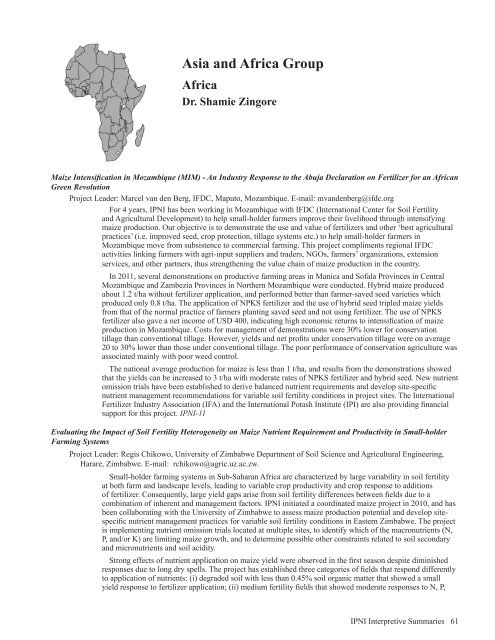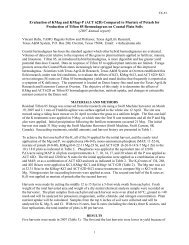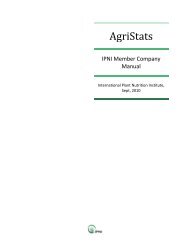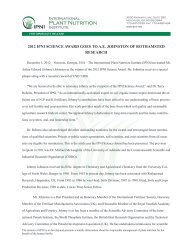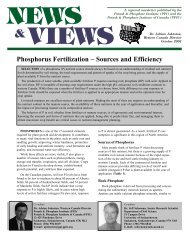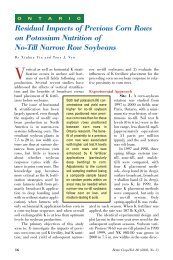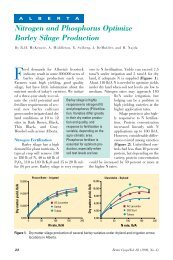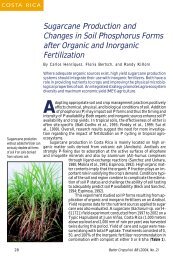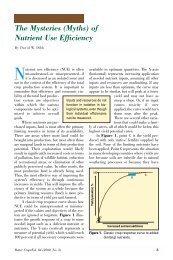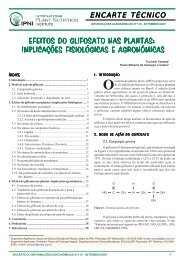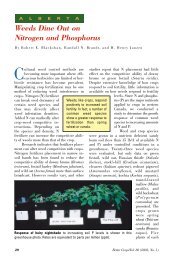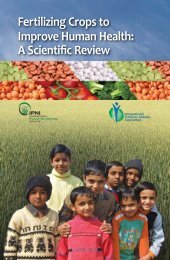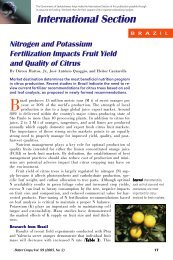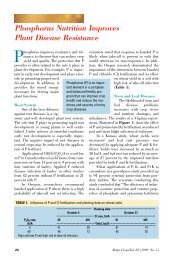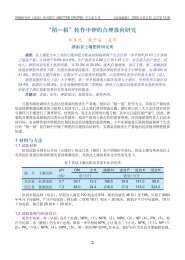Americas and Oceania Group - International Plant Nutrition Institute
Americas and Oceania Group - International Plant Nutrition Institute
Americas and Oceania Group - International Plant Nutrition Institute
You also want an ePaper? Increase the reach of your titles
YUMPU automatically turns print PDFs into web optimized ePapers that Google loves.
Asia <strong>and</strong> Africa <strong>Group</strong><br />
Africa<br />
Dr. Shamie Zingore<br />
Maize Intensification in Mozambique (MIM) - An Industry Response to the Abuja Declaration on Fertilizer for an African<br />
Green Revolution<br />
Project Leader: Marcel van den Berg, IFDC, Maputo, Mozambique. E-mail: mv<strong>and</strong>enberg@ifdc.org<br />
For 4 years, IPNI has been working in Mozambique with IFDC (<strong>International</strong> Center for Soil Fertility<br />
<strong>and</strong> Agricultural Development) to help small-holder farmers improve their livelihood through intensifying<br />
maize production. Our objective is to demonstrate the use <strong>and</strong> value of fertilizers <strong>and</strong> other ‘best agricultural<br />
practices’ (i.e. improved seed, crop protection, tillage systems etc.) to help small-holder farmers in<br />
Mozambique move from subsistence to commercial farming. This project compliments regional IFDC<br />
activities linking farmers with agri-input suppliers <strong>and</strong> traders, NGOs, farmers’ organizations, extension<br />
services, <strong>and</strong> other partners, thus strengthening the value chain of maize production in the country.<br />
In 2011, several demonstrations on productive farming areas in Manica <strong>and</strong> Sofala Provinces in Central<br />
Mozambique <strong>and</strong> Zambezia Provinces in Northern Mozambique were conducted. Hybrid maize produced<br />
about 1.2 t/ha without fertilizer application, <strong>and</strong> performed better than farmer-saved seed varieties which<br />
produced only 0.8 t/ha. The application of NPKS fertilizer <strong>and</strong> the use of hybrid seed tripled maize yields<br />
from that of the normal practice of farmers planting saved seed <strong>and</strong> not using fertilizer. The use of NPKS<br />
fertilizer also gave a net income of USD 400, indicating high economic returns to intensification of maize<br />
production in Mozambique. Costs for management of demonstrations were 30% lower for conservation<br />
tillage than conventional tillage. However, yields <strong>and</strong> net profits under conservation tillage were on average<br />
20 to 30% lower than those under conventional tillage. The poor performance of conservation agriculture was<br />
associated mainly with poor weed control.<br />
The national average production for maize is less than 1 t/ha, <strong>and</strong> results from the demonstrations showed<br />
that the yields can be increased to 3 t/ha with moderate rates of NPKS fertilizer <strong>and</strong> hybrid seed. New nutrient<br />
omission trials have been established to derive balanced nutrient requirements <strong>and</strong> develop site-specific<br />
nutrient management recommendations for variable soil fertility conditions in project sites. The <strong>International</strong><br />
Fertilizer Industry Association (IFA) <strong>and</strong> the <strong>International</strong> Potash <strong>Institute</strong> (IPI) are also providing financial<br />
support for this project. IPNI-11<br />
Evaluating the Impact of Soil Fertility Heterogeneity on Maize Nutrient Requirement <strong>and</strong> Productivity in Small-holder<br />
Farming Systems<br />
Project Leader: Regis Chikowo, University of Zimbabwe Department of Soil Science <strong>and</strong> Agricultural Engineering,<br />
Harare, Zimbabwe. E-mail: rchikowo@agric.uz.ac.zw.<br />
Small-holder farming systems in Sub-Saharan Africa are characterized by large variability in soil fertility<br />
at both farm <strong>and</strong> l<strong>and</strong>scape levels, leading to variable crop productivity <strong>and</strong> crop response to additions<br />
of fertilizer. Consequently, large yield gaps arise from soil fertility differences between fields due to a<br />
combination of inherent <strong>and</strong> management factors. IPNI initiated a coordinated maize project in 2010, <strong>and</strong> has<br />
been collaborating with the University of Zimbabwe to assess maize production potential <strong>and</strong> develop sitespecific<br />
nutrient management practices for variable soil fertility conditions in Eastern Zimbabwe. The project<br />
is implementing nutrient omission trials located at multiple sites, to identify which of the macronutrients (N,<br />
P, <strong>and</strong>/or K) are limiting maize growth, <strong>and</strong> to determine possible other constraints related to soil secondary<br />
<strong>and</strong> micronutrients <strong>and</strong> soil acidity.<br />
Strong effects of nutrient application on maize yield were observed in the first season despite diminished<br />
responses due to long dry spells. The project has established three categories of fields that respond differently<br />
to application of nutrients: (i) degraded soil with less than 0.45% soil organic matter that showed a small<br />
yield response to fertilizer application; (ii) medium fertility fields that showed moderate responses to N, P,<br />
IPNI Interpretive Summaries 61


